
Every person has the right to make decisions about their own life. For people with disability, having choice and control is especially important when it comes to navigating the NDIS (National Disability Insurance Scheme), setting goals and accessing services. Supported Decision Making plays a vital role in ensuring that individuals can exercise these rights confidently, with the appropriate support to understand their options and make informed choices.
However, not everyone can make complex decisions alone and that’s where supported decision-making plays a critical role. This approach ensures that people with disability can remain in control while receiving the right support to make informed choices.
In this article, we explain what supported decision-making means, how it fits into the NDIS and why it is essential for empowering individuals and promoting inclusive disability support in Australia.
What Is Supported Decision-Making?
Supported decision-making is a process that helps people with disability make their own decisions by providing the assistance they need without taking away their independence. Instead of making decisions on their behalf, supporters help them understand their options and express their preferences.
Examples of support include:
- Explaining options in plain language
- Using visual tools or examples to communicate choices
- Supporting conversations with service providers
- Helping the person compare outcomes and consider risks
Most importantly, the person remains the decision-maker at all times.
Why Supported Decision-Making Is Important for NDIS Participants
Under the NDIS, choice and control are key guiding principles. Supported decision-making aligns perfectly with these values, as it empowers participants to be active in their own planning and decision-making process.
Here’s why it matters:
- It upholds a person’s legal right to make decisions about their life
- It builds independence, self-confidence and real-world life skills
- It helps reduce the need for guardianship or substitute decision-making
- Supporters ensure they truly hear and respect NDIS participants.
When individuals feel supported rather than controlled, they are more likely to stay engaged in their own development and achieve better outcomes.
The NDIS Supported Decision-Making Policy
The NDIA (National Disability Insurance Agency) recently introduced a Supported Decision-Making Policy to formalise and strengthen how the NDIS supports people with disability in making choices.
This policy focuses on key areas such as:
- Applying for the NDIS
- Setting and achieving personal goals
- Choosing providers and supports
- Managing and reviewing NDIS plans
The policy also outlines the importance of co-designed tools and training, created in partnership with Inclusion Australia and other disability-led organisations, to ensure people with lived experience shape the way support is delivered.
Four Principles of Supported Decision-Making
The policy is based on four key principles that help guide how supported decision-making is delivered within the NDIS:
- All adults have the right to make their own decisions and those decisions must be respected.
- People must have access to the support they need to communicate and participate in decision-making.
- Decisions should reflect the individual’s will, preferences and rights, not someone else’s opinion.
- Safeguards must be in place to prevent abuse, neglect or exploitation while supporting autonomy.
These principles ensure that NDIS participants receive not only the freedom to choose but also the protection they deserve.
Who Can Support Decision-Making?
People with disability can choose who supports them in making decisions. This may include:
- Family members
- Close friends
- Carers
- NDIS support coordinators
- Advocates or legal nominees
The supporter’s role is to assist, not decide. They help clarify information, ask guiding questions and ensure the person understands the options but they must never override the individual’s wishes.
How the NDIS Is Strengthening Supported Decision-Making
The Supported Decision-Making Implementation Plan outlines five key steps the NDIS will take to embed this approach across Australia:
- Create more opportunities for NDIS participants to make decisions
- Build decision-making skills for participants
- Train supporters such as carers, families and disability professionals
- Strengthen the skills of NDIA staff and community partners
- Improve how nominees are appointed and reviewed under the NDIS
This long-term approach ensures that supported decision-making becomes a core part of every NDIS participant’s journey.
Real-Life Examples of Supported Decision-Making in Action
Supported decision-making can happen in simple, everyday moments. For example:
- A participant chooses a support worker after interviewing several people and receiving help understanding their qualifications.
- A young adult uses visual planning tools to decide which life goals to focus on in their new NDIS plan.
- A support coordinator helps someone explore different housing options by presenting photos and outlining the pros and cons of each.
In every situation, the person makes the final decision but with support that fits their individual needs.
Everyone Uses Support to Make Decisions
It is important to remember that everyone needs help making decisions at times. Whether it’s financial advice, legal support or simply asking a friend for their opinion, decision-making with support is normal.
For people with disability, the key difference is that this support may need to be more consistent, structured or formalised. The NDIS Supported Decision-Making Hub, developed with Inclusion Australia, provides helpful tools, training and easy-to-read resources to assist with this.
Conclusion: Supporting Confidence, Not Taking Control
Supported decision-making is about respect, inclusion and empowerment. It recognises the abilities of every individual to lead their own life and ensures they are given the right kind of help when needed.
When we shift from substitute to supported decision-making, we give NDIS participants the tools they need to build confidence, grow their independence and truly take control of their journey.
About Hope & Care Community Services
At Hope & Care Community Services (HCCS), we believe everyone should have the opportunity to make their own choices with the right support. As a trusted NDIS provider in Queensland, we embed supported decision-making into every part of our work. From support coordination and in-home care to community participation and life skills training, we help individuals lead their lives on their own terms. We walk alongside participants, not in front because we believe the best outcomes come when people are empowered to choose their own path.
Want to learn more? Read other articles :
- Redefine Independence your own way – with HCCS
- Who’s Who: The Key Terms of Your NDIS Plan
- Foundational Supports: Building Blocks of NDIS Success
HCCS is a registered NDIS provider. Learn more about our services.
♥ We are available in Brisbane! – Our team is just a call away!
